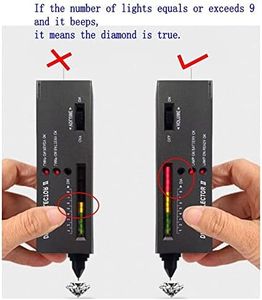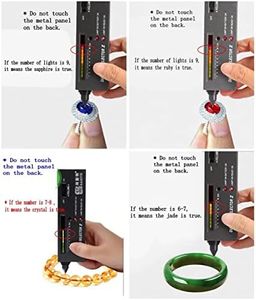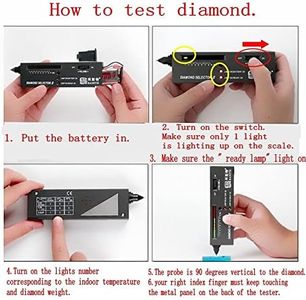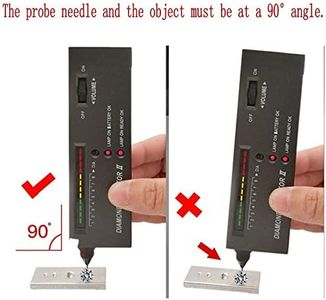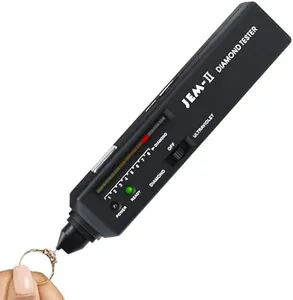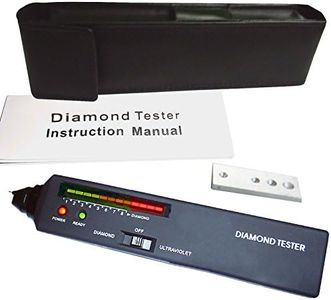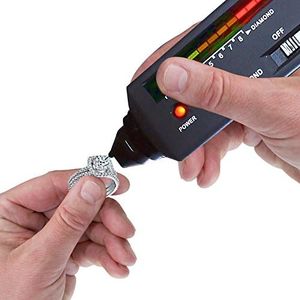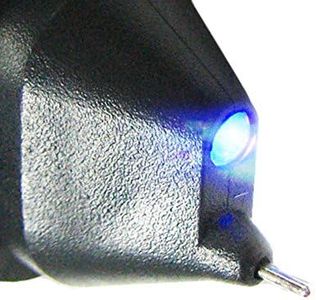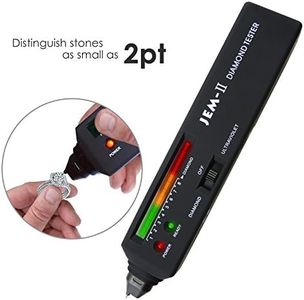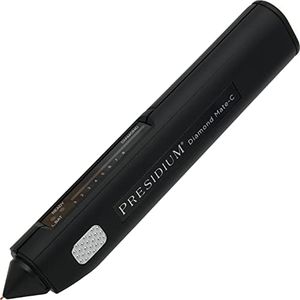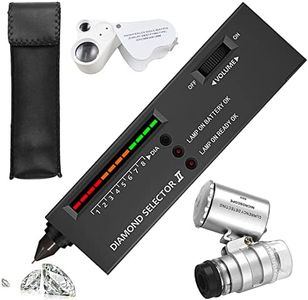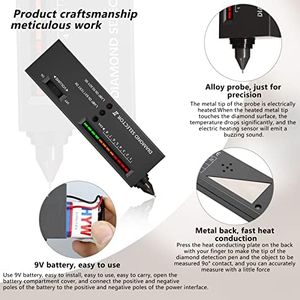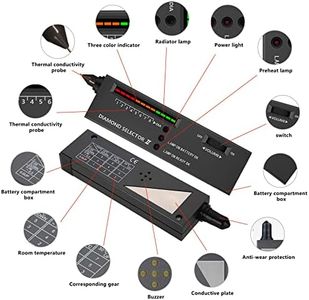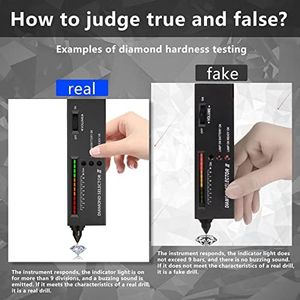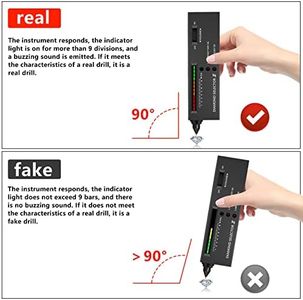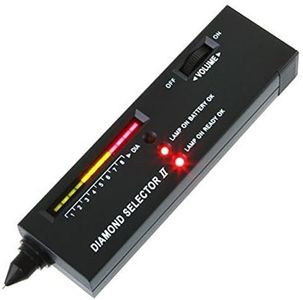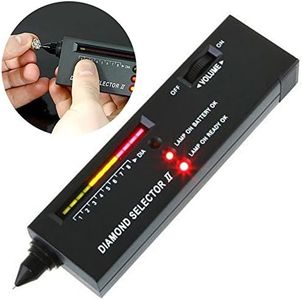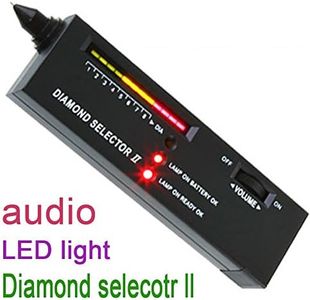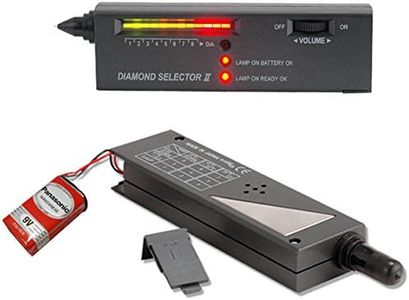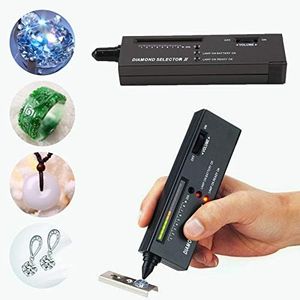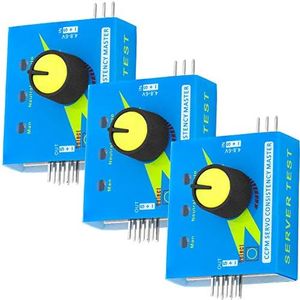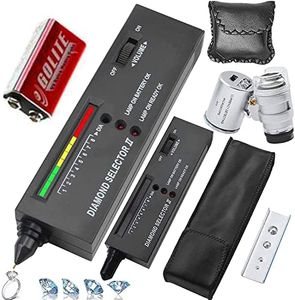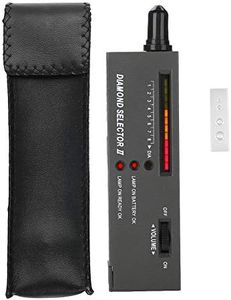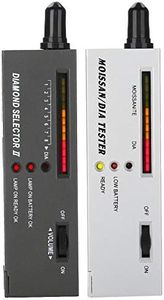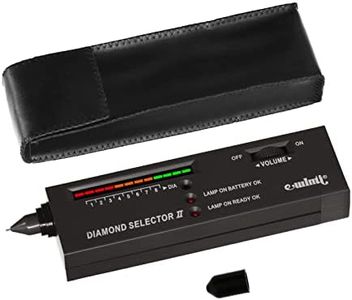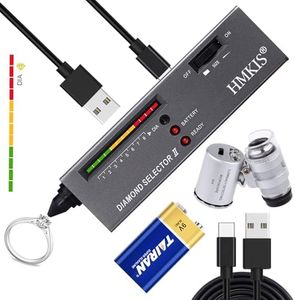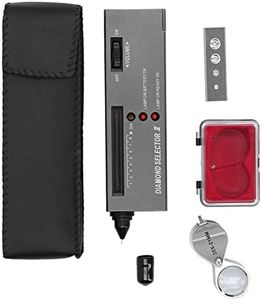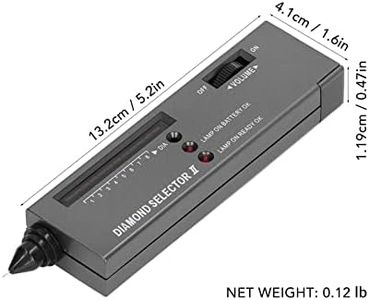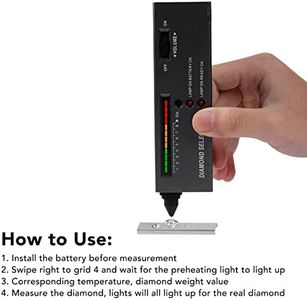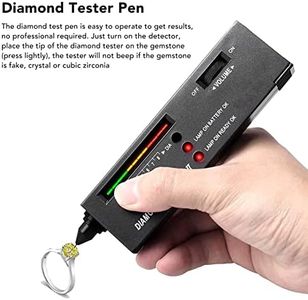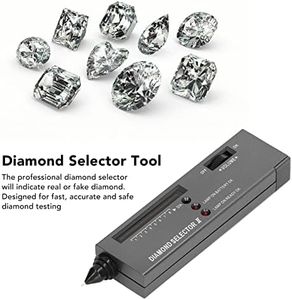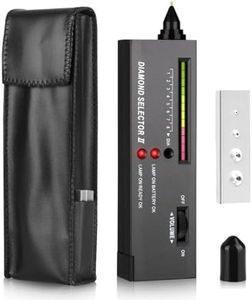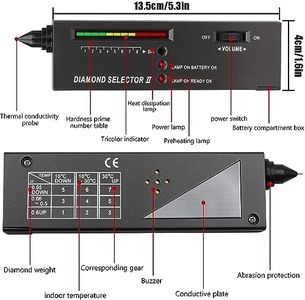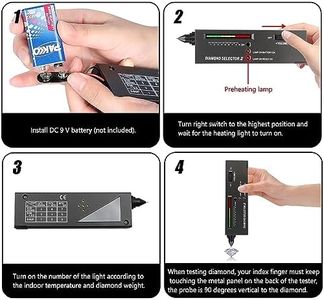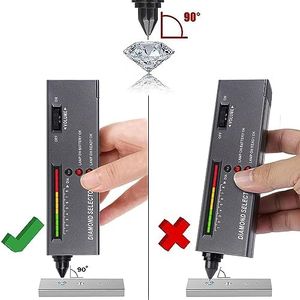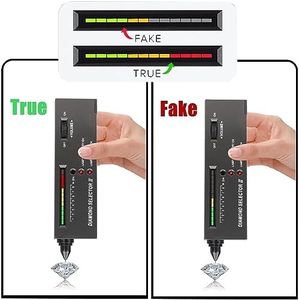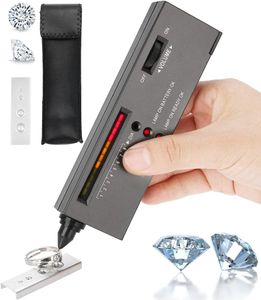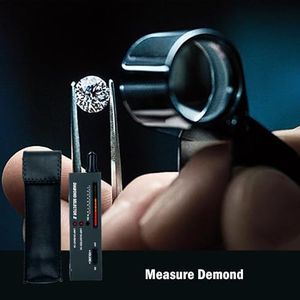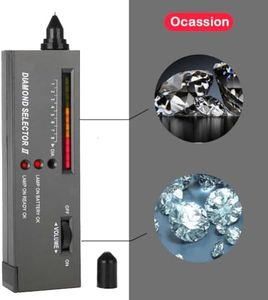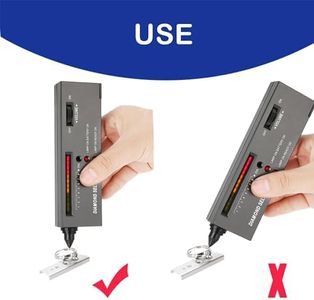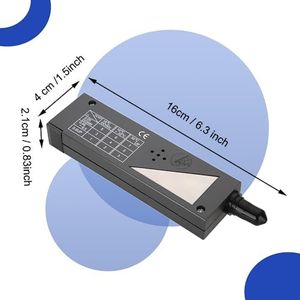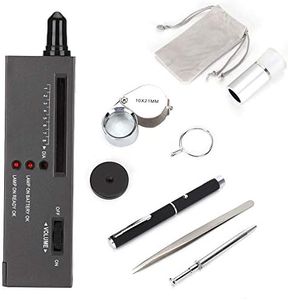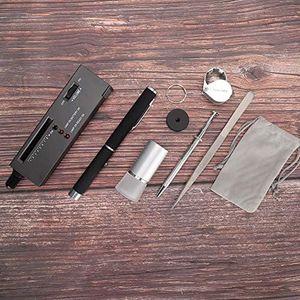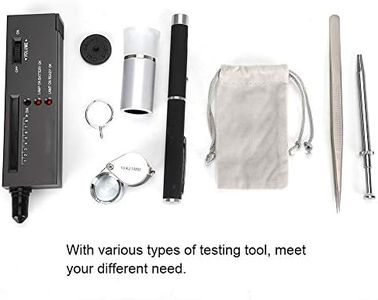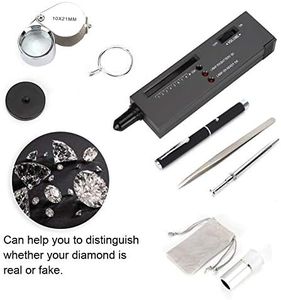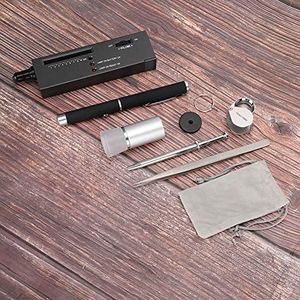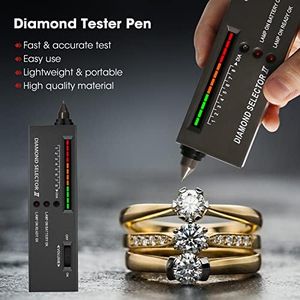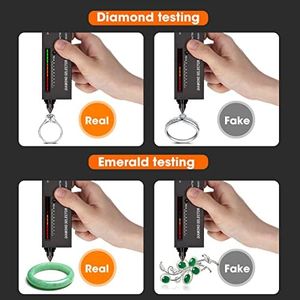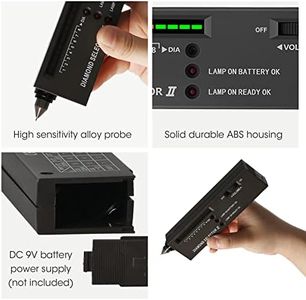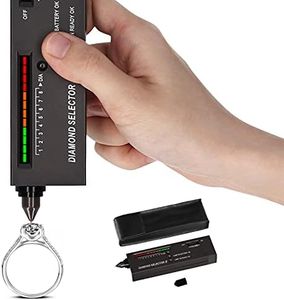10 Best Diamond Testers 2025 in the UK
Winner
9.9 score
JZK Portable Electronic Diamond Tester Pen for Diamond, Sapphire, Ruby, Crystal, Agate, Jade, gems Multi Gemstone Precious Stones Hardness Test Tool, Diamond Selector II V2
JZK Portable Electronic Diamond Tester Pen for Diamond, Sapphire, Ruby, Crystal, Agate, Jade, gems Multi Gemstone Precious Stones Hardness Test Tool, Diamond Selector II V2
Chosen by 1112 this week
Handheld DIAMOND TESTER with UV Ultraviolet Light, Mounted Jewelry Loose Stone Gemstone 2pt Jewel Stone Tool Selector For Novice and Expert, No Calibration Needed
Handheld DIAMOND TESTER with UV Ultraviolet Light, Mounted Jewelry Loose Stone Gemstone 2pt Jewel Stone Tool Selector For Novice and Expert, No Calibration Needed
PRESIDIUM DIAMONDMATE-C ELECTRONIC DIAMOND TESTER
PRESIDIUM DIAMONDMATE-C ELECTRONIC DIAMOND TESTER
Diamond Tester Pen, High Accuracy Electronic Jewelry Diamond Tester Pen Professional Diamond Detector with 2Pcs 30X 60X Magnifying Glasses Mini Led Foldable Magnifying
Diamond Tester Pen, High Accuracy Electronic Jewelry Diamond Tester Pen Professional Diamond Detector with 2Pcs 30X 60X Magnifying Glasses Mini Led Foldable Magnifying
Our technology thoroughly searches through the online shopping world, reviewing hundreds of sites. We then process and analyze this information, updating in real-time to bring you the latest top-rated products. This way, you always get the best and most current options available.

Our Top Picks
Winner
JZK Portable Electronic Diamond Tester Pen for Diamond, Sapphire, Ruby, Crystal, Agate, Jade, gems Multi Gemstone Precious Stones Hardness Test Tool, Diamond Selector II V2
The JZK Portable Electronic Diamond Tester Pen is a versatile tool designed to test not just diamonds but also other gemstones like sapphires, rubies, crystals, agates, and jade. One of its primary strengths is its multi-gemstone detection capability, making it useful for those who need to verify a variety of precious stones.
The device uses a straightforward light and beep system to indicate the authenticity of different gems, which can be very user-friendly once understood. However, the instructions might seem a bit complex for beginners, especially with the need for calibration and different handling techniques for various gemstones. This could be a minor drawback for someone new to gemstone testing.
The tester is lightweight (100g) and portable, making it convenient to carry around. It operates on a 9V battery (not included), so it's essential to have spare batteries on hand to ensure uninterrupted use. With a size of 16*4*2.2 cm, it is compact and easy to handle. Some users may find the need to maintain a 90° angle during testing and the requirement for the right index finger to touch the metal panel while testing diamonds slightly cumbersome. The product ranks decently among multi-testers and jewelry accessories. The JZK Portable Electronic Diamond Tester Pen is a highly functional and portable tool suitable for those needing to test multiple types of gemstones, though it may require a bit of a learning curve for optimal use.
Handheld DIAMOND TESTER with UV Ultraviolet Light, Mounted Jewelry Loose Stone Gemstone 2pt Jewel Stone Tool Selector For Novice and Expert, No Calibration Needed
The GAIN EXPRESS Handheld DIAMOND TESTER is designed for both novice and expert users, making it a versatile option for retail jewelers and pawn brokers. Its reliable diamond selector can accurately distinguish genuine diamonds from imitation crystals like cubic zirconia and moissanite. Additionally, the tester includes ultraviolet light for fluorescent reaction testing, aiding in the detection of natural diamonds. Its compact design is a significant advantage, offering portability and ease of handling, along with low battery consumption for extended usability.
The option to use an A/C adaptor for extended indoor use adds to its convenience. However, some users might find the audible warning sounds when the probe touches a metal surface intrusive. While generally accurate, some reviews suggest occasional inconsistencies in precision when detecting smaller stones, which could be concerning for detailed assessments. The lack of a need for calibration simplifies operation, enhancing user-friendliness, but might raise questions about long-term accuracy without periodic calibration.
Despite these minor issues, the ease of use, along with the complete set including a vinyl pouch and testing platform, makes it a practical choice for those looking for a convenient and effective diamond testing tool.
PRESIDIUM DIAMONDMATE-C ELECTRONIC DIAMOND TESTER
The PRESIDIUM DIAMONDMATE-C Electronic Diamond Tester is designed for those who need to accurately distinguish diamonds from simulants. It uses thermal conductivity testing, a reliable method for identifying real diamonds. One of its strengths is its low battery consumption and the handy low battery indicator, ensuring you won't be caught off guard by a dead battery.
The metal detector feature is also useful, alerting you when the tester accidentally touches the gem mounting, which can help prevent inaccurate readings. Additionally, the instant recovery time between tests means you can work efficiently without long waits between testing different stones. Weighing only 290 grams and with compact dimensions, this portable device is easy to carry and use on the go.
While the product includes an adaptor and carrying case, it does not come with batteries, which could be inconvenient if you don't have the required batteries on hand. It is designed primarily for diamond testing, so its compatibility with other gem types may be limited. This device is a good fit for jewelers or anyone frequently working with diamonds who needs a reliable and portable testing tool.


